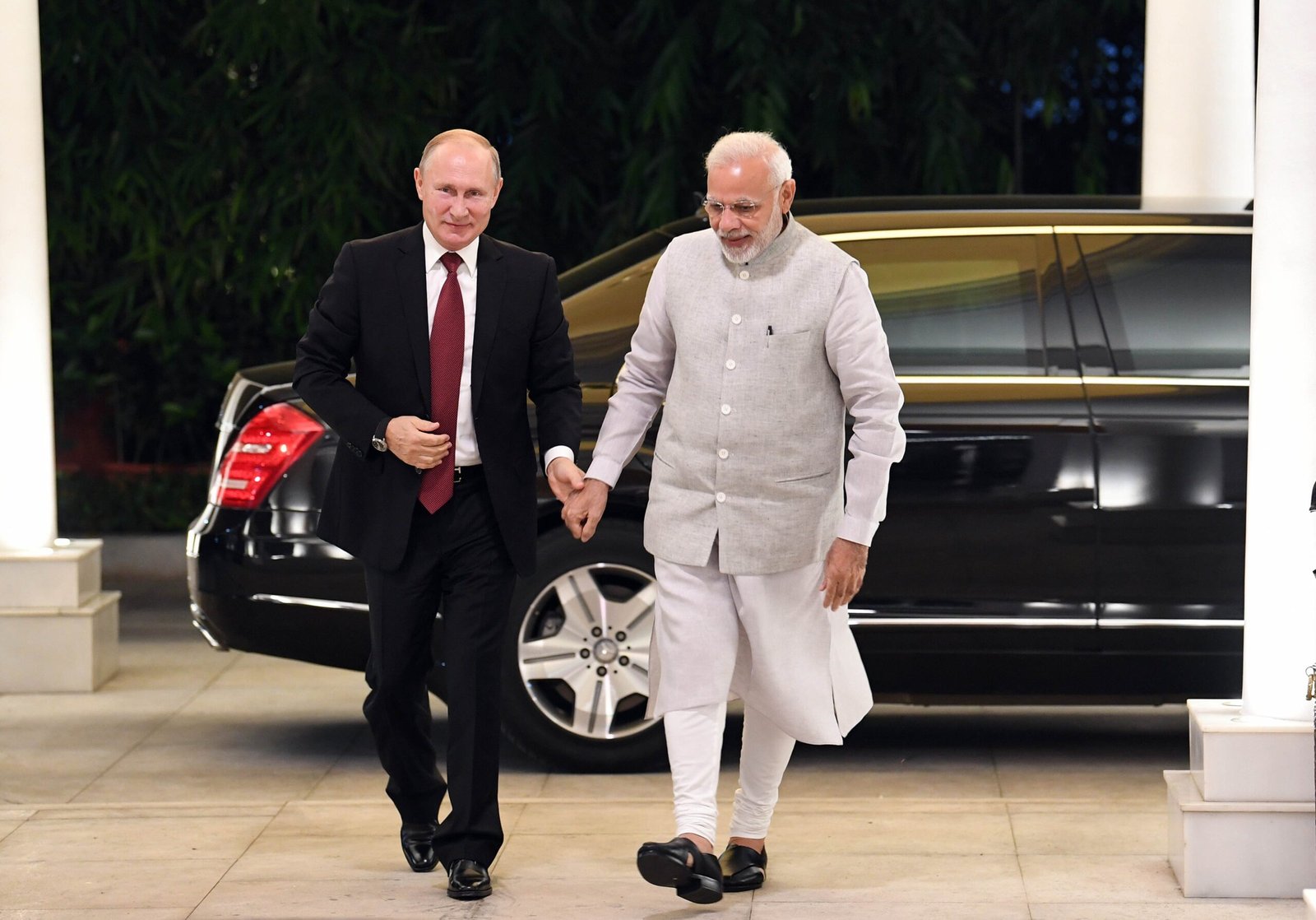On a cool July evening, Prime Minister Narendra Modi landed in Moscow for a pivotal diplomatic engagement that would test India’s balancing act between global pressures and longstanding alliances. This visit, Modi’s Moscow Visit which is first to Russia since the invasion of Ukraine in February 2022, held significant weight not only for the India-Russia relationship but also for the broader geopolitical landscape.

A Warm Welcome and Candid Discussions
Prime Minister Modi arrive in Moscow on July 8, 2024, and was met with a warm reception by Russian officials, underscoring the visit’s importance. At the Vnukovo-II VIP airport, Russian First Deputy Prime Minister Denis Manturov greeted Modi, highlighting the diplomatic significance of his arrival.
That evening, President Vladimir Putin hosted Modi at his dacha in Novo-Ogaryovo for an informal dinner. This rare honor allowed the two leaders to engage in a candid discussion away from the formality of official talks. Putin congratulated Modi on his recent re-election and praised his leadership and India’s economic achievements. Putin’s personal remarks underscored the respect and warmth in the bilateral relationship, setting a positive tone for the upcoming structured discussions.

Addressing Global Concerns Amidst Tensions
The timing of Modi’s Moscow Visit was particularly sensitive given the ongoing Russia-Ukraine conflict. The United States had recently voiced concerns about India’s relationship with Russia, urging India to use its influence to push Moscow towards respecting international norms and Ukraine’s sovereignty. The Biden administration’s stance reflected broader international concerns about Russia’s actions and India’s role in the global order.
India has navigated this delicate situation by maintaining its traditional ties with Russia while advocating for a peaceful resolution to the conflict. Modi’s visit was an opportunity to reaffirm this balancing act—strengthening bilateral relations with Russia while addressing international concerns about the war.

During their informal meeting, Modi emphasized India’s position that there is no military solution to the conflict. He reiterated India’s commitment to dialogue and diplomacy, aligning with the country’s longstanding foreign policy principles. Modi’s remarks were aim at demonstrating India’s commitment to peaceful conflict resolution while maintaining its strategic relationship with Russia.
Key Issues on the Summit Agenda
The formal talks on July 9 were set to address critical issues, including economic cooperation and regional security. Both leaders were expect to discuss ways to deepen their strategic partnership, focusing on defense, energy, and trade.
One pressing issue was the situation of Indian nationals who had been misled into joining the Russian military to fight in Ukraine. Reports had surfaced about travel agents deceiving Indians into enlisting under false pretenses. Modi raise this issue with Putin, seeking assurances that these individuals would be repatriate. Russia committed to addressing this concern, which was a significant step in resolving a pressing issue for the Indian government.
Economic cooperation also featured prominently on the agenda. Both nations aimed to enhance trade relations and explore new opportunities for investment in key sectors. The summit presented a chance to reinforce economic ties and address mutual interests in energy and technology.

The Broader Implications of Modi’s Moscow Visit
Modi’s Moscow Visit came at a time of shifting global dynamics, with the Russia-Ukraine conflict realigning international relations. For India, maintaining a strong relationship with Russia is crucial due to historical ties and strategic interests. At the same time, India faces pressure from Western nations to reconsider its ties with Moscow amid the ongoing conflict.
The visit highlighted the evolving nature of the India-Russia relationship. While the traditional partnership remains strong, both nations acknowledge the need to adapt to changing global circumstances. Modi’s Moscow Visit was a strategic move to reinforce India’s global position while achieving practical outcomes in bilateral relations.
Public and Diplomatic Reactions
The visit drew varied reactions from both domestic and international observers. Putin’s warm reception and the informal meeting underscored the strength of the India-Russia relationship. However, the visit also drew scrutiny from global stakeholders concerned about how India navigates its diplomatic commitments amidst the Ukraine crisis.

The U.S. State Department’s comments on India’s relationship with Russia reflected broader international concerns. While India reiterated its commitment to dialogue and peaceful conflict resolution, its continued engagement with Russia remained a point of observation for Western nations.
Conclusion: A Diplomatic Tightrope
Prime Minister Narendra Modi’s visit to Russia demonstrated India’s skillful diplomatic balancing act. The visit reinforced traditional ties with Russia while addressing contemporary challenges, including the Ukraine conflict and its global implications.
Also Read: ANI Sues Wikipedia for Rs 2 Crore Over Defamatory Content
Pinterest: Khabarey
As Modi and Putin engaged in discussions on economic cooperation and regional security. The visit underscored India’s commitment to maintaining a strong partnership with Russia while navigating the complexities of global politics. The outcomes of the summit and subsequent actions by both nations will likely influence the future trajectory of the India-Russia relationship and its role in the evolving global order.






